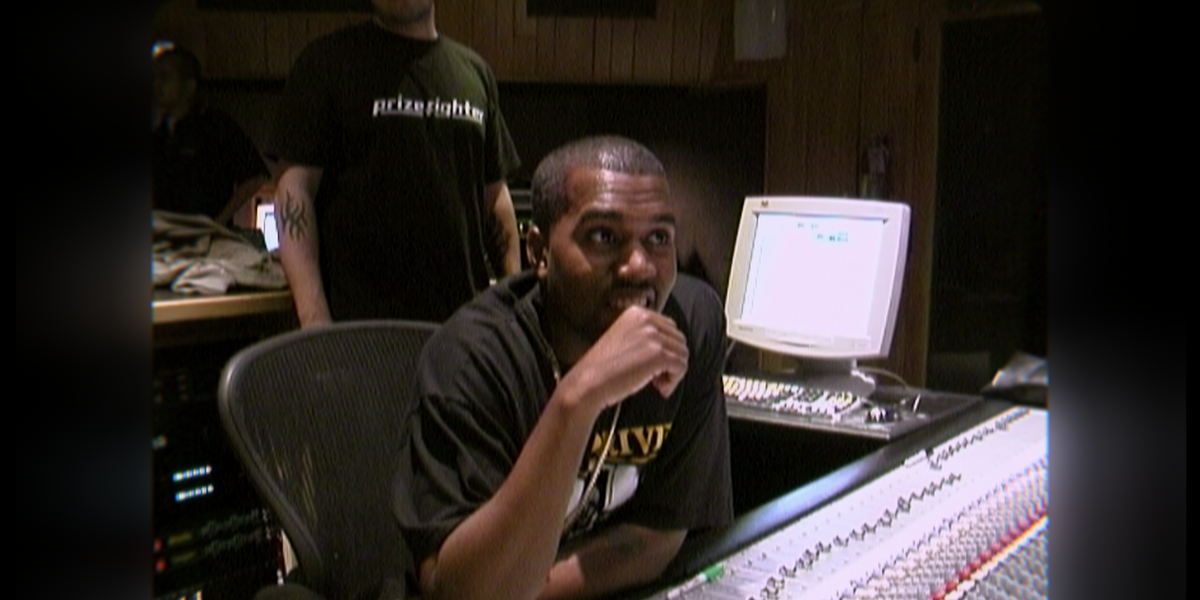
“Is there room for a self-proclaimed ‘backpack rapper’ in Roc-A-Fella’s Bentley hit parade? Meet Kanye West,” says MTV News VJ Gideon Yago while introducing a 2002 You Hear It First episode on the then-rising rapper. The journey to getting that episode on air is briefly covered in the first installment of Jeen-Yuhs, the three-part documentary on West’s rise to fame, available on Netflix.
Viewers get a brief view of West’s quest to get on MTV for what was then one of his biggest press moments to date. He’s shown asking MTV VJ Quddus for advice, and the camera catches a glimpse of MTV News PA Yasmine Richard. What isn’t clear is the integral role she played in that moment. Yago took to Twitter to give context to it in the documentary, and Richard followed up with an explainer video on Instagram. Like many young Black women before her, she was nearly an unsung part of the history she’s responsible for.
Back in 2002, Richard was a 24-year-old production assistant at MTV News. She was first introduced to West and his crew by a mutual friend. “[West] had just moved to New York, so he really didn’t know anybody outside of his circle and the people that he was working with,” Richard says. By that time, as shown in Jeen-Yuhs, West had made a name for himself as a producer but was trying to make the transition to rap artist. “Either The Blueprint was just about to come out or it had already come out. “Izzo” had already come out, so [West] was kind of known,” Richard says. “Whenever he would come upstairs [to MTV News offices] and hang out, [MTV VJ] Sway knew him. The hip-hop heads knew who this kid was.”
Still unsigned, West began campaigning for a feature on the popular You Hear It First. With interest from a few labels, he was in reach of the representation required to get him the coveted press spot on MTV News. After West was signed to Roc-A-Fella, Richard went to Sway to back her up on the pitch. The rest is history: The episode was green-lighted and Richard cut the video. When she showed West the script for the episode, “He was like, ‘Aw, you know, you should do this, this, this, and this,’” Richard recalls. “I’m like, ‘Uh-huh, I’m gonna do this because I’m the producer of this piece, and you can produce your music.’”
Today, Richard still works in the television industry and has over 20 years of experience. The release of Jeen-Yuhs has ignited an interest that she was not expecting but readily welcomes. “It’s really, really important to me that I tell people, ‘No, I did this,’” Richard says. “And it’s important to know that a woman did this, because especially in hip-hop, we get glazed over.”
There are dozens of young Black women like Richard working behind the scenes at media institutions often with the cultural cachet but none of the capital or the credit for their contributions. It shouldn’t be a shock that it was a young Black woman who worked in the background to get an episode about an unsigned upstart—who was widely familiar to those in the know but not recognized on national level—green-lighted. Culture making is always bottom up—not from the top.
Young Black people—especially young Black women—are cultural trendsetters who are often not given their due once the trend goes mainstream. Black culture is the basis for American popular culture. Writer Rebecca Walker dubbed it “Black Cool” in a book of essays of the same name, and artist Arthur Jafa calls it “Black Cognition.” Living at the intersection of being both a woman and Black equals double erasure in our own stories. What would the pop-culture landscape look like if Black women were allowed to take the lead on our cultural contributions? How many young black women have been exorcised from their rightful place in pop-culture history?
“We are so much part of the fabric, like down to the texture and fiber,” says Richard of Black women’s role in culture making. “Only what happens is, folks see the big picture and focus on that. It takes real reminders to let people know that it’s the details that make the magic,” she says.
For now, Richard is just happy to understand that her contributions are now known. “I feel like I was part of a miracle,” she says of being part of that moment in West’s early career. “I don’t feel like I’m owed anything. I’m not owed anything, because that’s part of who I am,” Richard says. “Look, where are we now 20 years [later]? A whole lot of people know who I am now, and they know that my contributions were genuine and it was from a place of love and encouragement, for my friend. That’s who I am.”
There’s one more thing we have to thank Richard for—introducing Coodi Simmons and Chike Ozah, the codirectors of the documentary. It’s safe to say that without Richard, Jeen-Yuhs as we know it would not exist.
This content is created and maintained by a third party, and imported onto this page to help users provide their email addresses. You may be able to find more information about this and similar content at piano.io
Who Gets to be a Black Genius?
Source: Filipino Journal Articles

0 Comments